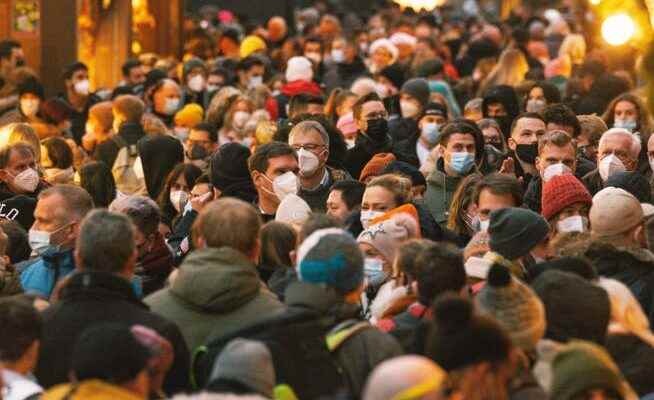The Health and Justice Ministers present a package of measures for the winter. Despite some correct impulses, a paternalistic activism prevails. Tensions in an already irritated society will continue to mount.
At the Cologne Christmas market in 2021, visitors wore masks. This could happen again next winter.

Alexander Kissler is the political editor of the NZZ in Germany.
You are reading an excerpt from the weekday newsletter “The Other View”, today by Alexander Kissler, editor in the Berlin office of the NZZ. Subscribe to the newsletter for free. Not resident in Germany? Benefit here.
This much is certain: this summer will also be followed by an autumn, which will be replaced by a winter. And it will be months when people contract the coronavirus. Many people will have no symptoms, some mild, some severe, and a very small proportion of those infected will die from contagion. That is where the certainties end. Nobody can say with certainty today whether there will be an epidemiologically challenging “corona winter”. The German government wants to stretch a lifeline across this abyss of uncertainty. It is good that there will be such a protection concept. But as it is now, the bundle of measures must not remain the last word.
The current Infection Protection Act expires at the end of September. After a complicated struggle, the Federal Minister of Health from the SPD and the Federal Minister of Justice from the FDP have agreed on a new legal framework. So far, there is no draft law, nor has the Bundestag dealt with it. What has now been announced should definitely be retained on the parliamentary path: the special focus on the protection of old and sick people. A nationwide “mask and test certificate obligation” for access to hospitals and care facilities makes sense.
What Karl Lauterbach has in mind
The possibility of lockdowns, curfews, school closures is no longer provided for. A reasonable conclusion is drawn from the relatively high vaccination rate, the large number of people who have recovered, the mutation of the virus and, last but not least, from the devastating psychological, social and economic side effects of draconian measures.
If criticism is poured down on the concept this Thursday, it will ignite on other points: The German Medical Association calls for the possibility of stricter rules across Germany, because in fact it would be up to the federal states and the state parliaments to take “optional, more extensive protective measures”. enacted
The German Hospital Society rightly misses the indicators that would have to be used to determine an actual threat to the healthcare system and infrastructure. An interview with Karl Lauterbach reveals that he envisages “a combination of incidence, admission to the clinic and wastewater analysis”.
Against all evidence
The sometimes scandalous weaknesses of the concept are even more striking than the success. In many places, the FDP allowed a Federal Minister of Health to do his job, who only seems to know the political aggregate states of panic, fear and concern. For example, why is the virus more dangerous when it affects students in fifth grade and higher? The dividing line should run there for a mask requirement in the classroom. In addition, the mask in schools generally does more harm than good. Educational institutions have not been drivers of the pandemic so far, while children suffer particularly from the face covering.
Bizarre and against all scientific evidence of aerosol research would be a “mask requirement outdoors if a minimum distance of 1.5 meters cannot be maintained”. Infections occur almost exclusively indoors. Once again, the already battered event industry would suffer if Christmas markets with masks were the consequence.
The entry into the vaccination subscription testifies to a cynical view of man. First the twice, then the three times vaccinated was completely vaccinated, in future only the freshly vaccinated should receive these consecrations. Only people “for whom the last vaccination was no more than three months ago” should be exempted from the optional test requirement when visiting restaurants or events and even when exercising. So if you shy away from the test procedure and its costs, you would have to be vaccinated four times a year with a drug whose effectiveness was overestimated and the side effects underestimated. At Biontech, Pfizer and Moderna one hears it with joy.
Vaccination should become a national sport
Despite the right impulses and sensible measures, the protection concept fails in the crucial point: it puts institutionalized distrust in the place of personal responsibility and thus strengthens the social centrifugal forces. A society that is already irritated by rapidly rising prices and anticipation of an energy crisis that will culminate in winter is subjected to an additional stress test. In the future, hosts should be able to segregate and reject their guests according to their individual protection status, the mask would finally become an everyday accessory, and regular vaccinations would become a desired and rewarded popular sport.
Yes, the measures could have been even more erratic. Yes, it is good that there is now a proposal on the table that can be discussed. But no, this concept is not a victory of reason and prudence and freedom. The special route remains a German autobahn.
